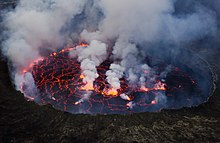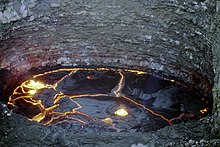| Revision as of 03:27, 13 October 2014 edit186.37.203.236 (talk) Undid revision 624160688 by SummerPhD (talk)← Previous edit | Revision as of 15:35, 30 October 2014 edit undoSummerPhD (talk | contribs)Extended confirmed users, Rollbackers91,322 edits Reverted good faith edits by 186.37.203.236 (talk): As sourced. recent depth is not only the highest but also varies considerably. (TW)Next edit → | ||
| Line 25: | Line 25: | ||
| ] has the distinction of having two persistent lava lakes: one in the ] vent cavity within the summit caldera, and another located within the ] cone located on the east rift zone of the volcano.<ref>{{cite web|url=http://volcanoes.usgs.gov/hvo/activity/kilaueastatus.php |title=HVO Kilauea Status |publisher=Volcanoes.usgs.gov |date= |accessdate=2013-08-15}}</ref> | ] has the distinction of having two persistent lava lakes: one in the ] vent cavity within the summit caldera, and another located within the ] cone located on the east rift zone of the volcano.<ref>{{cite web|url=http://volcanoes.usgs.gov/hvo/activity/kilaueastatus.php |title=HVO Kilauea Status |publisher=Volcanoes.usgs.gov |date= |accessdate=2013-08-15}}</ref> | ||
| ] lava lake has usually been the largest and most voluminous in recent history |
] lava lake has usually been the largest one (and the most voluminous) in recent history -the depth/size of lava lakes can vary considerably with time- reaching a size of 700 meters wide in 1982,<ref>{{cite web|url=http://www.volcano.si.edu/world/volcano.cfm?vnum=0203-03=&volpage=var |title=Global Volcanism Program : Nyiragongo |publisher=Volcano.si.edu |date= |accessdate=2013-08-15}}</ref> although ] is believed to have hosted an even larger lava lake at the time of the ], being 1000 meters wide in 1670.<ref>{{cite web|url=http://eps.mcgill.ca/~courses/c435/Gravity-papers/rymer%20et%20al%201998.pdf |title=Pit crater structure and processes governing persistent activity at Masaya Volcano, Nicaragua |publisher=Eps.mcgill.ca |accessdate=2013-08-15}}</ref> | ||
| In addition to the aforementioned persistent lava lakes, a certain number of occurrences of temporary lava lakes (sometimes called ''lava ponds'' or ''lava pools'', depending on their size and nature<ref name=haroun94>{{Cite doi|10.1016/0377-0273(94)90015-9}}</ref>) have also been observed and are listed in the ]. | In addition to the aforementioned persistent lava lakes, a certain number of occurrences of temporary lava lakes (sometimes called ''lava ponds'' or ''lava pools'', depending on their size and nature<ref name=haroun94>{{Cite doi|10.1016/0377-0273(94)90015-9}}</ref>) have also been observed and are listed in the ]. | ||
| Line 45: | Line 45: | ||
| |]<ref name=nyra/> (the largest one in the past century) || ] | |]<ref name=nyra/> (the largest one in the past century) || ] | ||
| |- | |- | ||
| ⚫ | ! scope="row" colspan="2"| Recent intermittent lava lake activity | ||
| ⚫ | |]<ref>{{cite gvp|vnum=0507-04=|name=Ambrum}}</ref> (two lava lakes in both Benbow and Marum craters |
||
| ⚫ | |- | ||
| ⚫ | ! scope="row" colspan="2"| Recent intermittent lava lake activity | ||
| |- | |- | ||
| |]<ref>{{cite gvp|vnum=1404–10=|name=Masaya}}</ref> || ] | |]<ref>{{cite gvp|vnum=1404–10=|name=Masaya}}</ref> || ] | ||
| |- | |- | ||
| ⚫ | |]<ref>{{cite gvp|vnum=0507-04=|name=Ambrum}}</ref> (two lava lakes in both Benbow and Marum craters) || ], ] | ||
| ⚫ | |- | ||
| |]<ref>{{cite gvp|vnum=1507–12=|name=Villarrica}}</ref> || ] | |]<ref>{{cite gvp|vnum=1507–12=|name=Villarrica}}</ref> || ] | ||
| |- | |- | ||
Revision as of 15:35, 30 October 2014







Lava lakes are large volumes of molten lava, usually basaltic, contained in a volcanic vent, crater, or broad depression. The term is used to describe both lava lakes that are wholly or partly molten and those that are solidified (sometimes referred to as frozen lava lakes in this case).
Formation
Lava lakes can form in three ways:
- From one or more vents in a crater that erupts enough lava to partially fill the crater
- When lava pours into a crater or broad depression and partially fills the crater
- Atop a new vent that erupts lava continuously for a period of several weeks or more and slowly builds a crater progressively higher than the surrounding ground.
Notable examples
Persistent lava lakes are a rare phenomenon. Only a few volcanoes have hosted persistent or near-persistent lava lakes during recent decades:
- Erta Ale, Ethiopia,
- Mount Erebus, Antarctica (Ross Island),
- Kīlauea, Hawaii (Big Island),
- Mount Nyiragongo, Democratic Republic of the Congo.
Kīlauea has the distinction of having two persistent lava lakes: one in the Halemaʻumaʻu vent cavity within the summit caldera, and another located within the Puʻu ʻŌʻō cone located on the east rift zone of the volcano.
Nyiragongo lava lake has usually been the largest one (and the most voluminous) in recent history -the depth/size of lava lakes can vary considerably with time- reaching a size of 700 meters wide in 1982, although Masaya is believed to have hosted an even larger lava lake at the time of the Spanish conquest, being 1000 meters wide in 1670.
In addition to the aforementioned persistent lava lakes, a certain number of occurrences of temporary lava lakes (sometimes called lava ponds or lava pools, depending on their size and nature) have also been observed and are listed in the following table.
List of volcanoes having displayed past or present lava lake activity
| This list is incomplete; you can help by adding missing items. (May 2012) |
| Volcano | Location |
|---|---|
| Persistent or near-persistent lava lakes during recent decades | |
| Erta Ale | Ethiopia |
| Mount Erebus | Ross Island, Antarctica |
| Kīlauea (two lava lakes in both Halemaʻumaʻu and Pu'u O'o craters) | Hawaii (Big Island) |
| Nyiragongo (the largest one in the past century) | Democratic Republic of the Congo |
| Recent intermittent lava lake activity | |
| Masaya | Nicaragua |
| Ambrym (two lava lakes in both Benbow and Marum craters) | Ambrym Island, Vanuatu |
| Villarrica | Chile |
| Karthala | Grande Comore, Comoros |
| Piton de la Fournaise (small temporary lava pond in Dolomieu crater) | Réunion Island |
| Ol Doinyo Lengai (only occurrence of carbonatite lava pond as it is the only active volcano in the world emitting carbonatite lava) | Tanzania |
| Unconfirmed lava lake activity | |
| Telica (possibly in 1971 and 1999–2000) | Nicaragua |
| Tungurahua (possibly in 1999) | Ecuador |
| Tofua (possibly in 2004 and 2006) | Tofua Island, Tonga |
| Nabro (possibly in 2012) | Eritrea |
| Lava lake activity suggested by satellite remote-sensing data | |
| Mount Michael | Saunders Island, South Sandwich Islands |
| Mount Belinda | Montagu Island, South Sandwich Islands |
| Mawson Peak | Heard Island |
| Past lava lake activity (historical times) | |
| Mount Matavanu (during the 1905–1911 eruption) | Savai'i Island, Samoa |
| Nyamuragira (lava lake located within the summit caldera, confirmed for the first time in 1921, drained in 1938, and temporary lava pond in the Kituro cone on the SW flank, during the 1948 eruption) | Democratic Republic of the Congo |
| Capelinhos (in 1958, a Surtseyan eruption) | Faial Island, Azores |
| Surtsey Island (in 1964, during the 1963–67 eruption which led to the formation of the island) | Iceland |
| Tolbachik, part of the Klyuchevskaya volcanic complex (last observation of lava lake activity in 1964) | Kamchatka, Russia |
| Etna (in 1974) | Sicily, Italy |
| Ardoukôba (in 1978) | Djibouti |
| Mount Mihara (in 1986) | Izu Ōshima, Japan |
| Stromboli (in 1986 and 1989) | Aeolian Islands, Italy |
| La Cumbre (in 1995) | Fernandina Island, Galápagos |
| Pacaya (in 2000 and 2001) | Guatemala |
See also
References
- "VHP Photo Glossary: Lava lake". Volcanoes.usgs.gov. Retrieved 2013-08-15.
- ^ "Global Volcanism Program : Erta Ale". Volcano.si.edu. Retrieved 2013-08-15.
- ^ "Global Volcanism Program : Erebus". Volcano.si.edu. Retrieved 2013-08-15.
- ^ "Kīlauea". Global Volcanism Program. Smithsonian Institution.
- ^ "Nyiragongo". Global Volcanism Program. Smithsonian Institution.
- "HVO Kilauea Status". Volcanoes.usgs.gov. Retrieved 2013-08-15.
- "Global Volcanism Program : Nyiragongo". Volcano.si.edu. Retrieved 2013-08-15.
- "Pit crater structure and processes governing persistent activity at Masaya Volcano, Nicaragua" (PDF). Eps.mcgill.ca. Retrieved 2013-08-15.
- Attention: This template ({{cite doi}}) is deprecated. To cite the publication identified by doi:10.1016/0377-0273(94)90015-9, please use {{cite journal}} (if it was published in a bona fide academic journal, otherwise {{cite report}} with
|doi=10.1016/0377-0273(94)90015-9instead. - "Masaya". Global Volcanism Program. Smithsonian Institution.
- "Ambrum". Global Volcanism Program. Smithsonian Institution.
- "Villarrica". Global Volcanism Program. Smithsonian Institution.
- "Global Volcanism Program : Karthala". Volcano.si.edu. Retrieved 2013-08-15.
- "Global Volcanism Program : Fournaise, Piton de la". Volcano.si.edu. doi:10.1029/2007GL031248. Retrieved 2013-08-15.
- "Terre et Volcans News v4". Terreetvolcans.free.fr. Retrieved 2013-08-15.
- "Global Volcanism Program : Lengai, Ol Doinyo". Volcano.si.edu. Retrieved 2013-08-15.
- "Etnatao: Ol Doinyo Lengai Volcano Tanzania". YouTube. 2010-02-11. Retrieved 2013-08-15.
- "Global Volcanism Program : Telica". Volcano.si.edu. Retrieved 2013-08-15.
- "Global Volcanism Program : Tungurahua". Volcano.si.edu. Retrieved 2013-08-15.
- "Global Volcanism Program : Tofua". Volcano.si.edu. Retrieved 2013-08-15.
- "Eruption volcanique, activité éruptive du volcan Nabro". Activolcans.info. Retrieved 2013-08-15.
- "Global Volcanism Program : Michael". Volcano.si.edu. Retrieved 2013-08-15.
- First recorded eruption of Mount Belinda volcano (Montagu Island), South Sandwich Islands, Bull Volcanol (2005) 67:415–422 (PDF)
- "Global Volcanism Program : Heard". Volcano.si.edu. Retrieved 2013-08-15.
- "Global Volcanism Program : Savai'i". Volcano.si.edu. 2013-01-03. Retrieved 2013-08-15.
- ^ Tazieff, Haroun, Cratères en feu, éd. Arthaud, 1951.
- "Global Volcanism Program : Nyamuragira". Volcano.si.edu. Retrieved 2013-08-15.
- "GC1QN4C Capelinhos Volcano [Faial] (Earthcache) in Arquipélago dos Açores, Portugal created by almeidara". Geocaching.com. Retrieved 2013-08-15.
- http://www.volcano.si.edu/volcano.cfm?vn=382010
- "Global Volcanism Program : Vestmannaeyjar". Volcano.si.edu. Retrieved 2013-08-15.
- "Inspired by Iceland stories: Tell us the story of your visit to Iceland". Stories.inspiredbyiceland.com. 2011-05-26. Retrieved 2013-08-15.
- Duncan C. Blanchard, From Raindrops to Volcanoes: Adventures With Sea Surface Meteorology, Dover Publications, 1967.
- "Global Volcanism Program : Tolbachik". Volcano.si.edu. Retrieved 2013-08-15.
- "Global Volcanism Program : Etna". Volcano.si.edu. doi:10.1029/2005GL022527.2005. Retrieved 2013-08-15.
- "Global Volcanism Program : Ardoukôba". Volcano.si.edu. 2013-01-03. Retrieved 2013-08-15.
- "Izu-Oshima Volcano Observatory". Retrieved 2014-02-20.
- "Global Volcanism Program : Stromboli". Volcano.si.edu. Retrieved 2013-08-15.
- "Global Volcanism Program : Fernandina". Volcano.si.edu. Retrieved 2013-08-15.
- "Global Volcanism Program : Pacaya". Volcano.si.edu. doi:10.1029/2007GC001791. Retrieved 2013-08-15.
![]() This article incorporates public domain material from the Volcano Hazards Program. VHP Photo Glossary: Lava lake. United States Geological Survey.
This article incorporates public domain material from the Volcano Hazards Program. VHP Photo Glossary: Lava lake. United States Geological Survey.
External links
- Lava lake in Nyiragongo Volcano crater. Video on France 24 TV
- Into the mouth of a volcano, video footage of lava lake in Vanuatu's Marum volcano